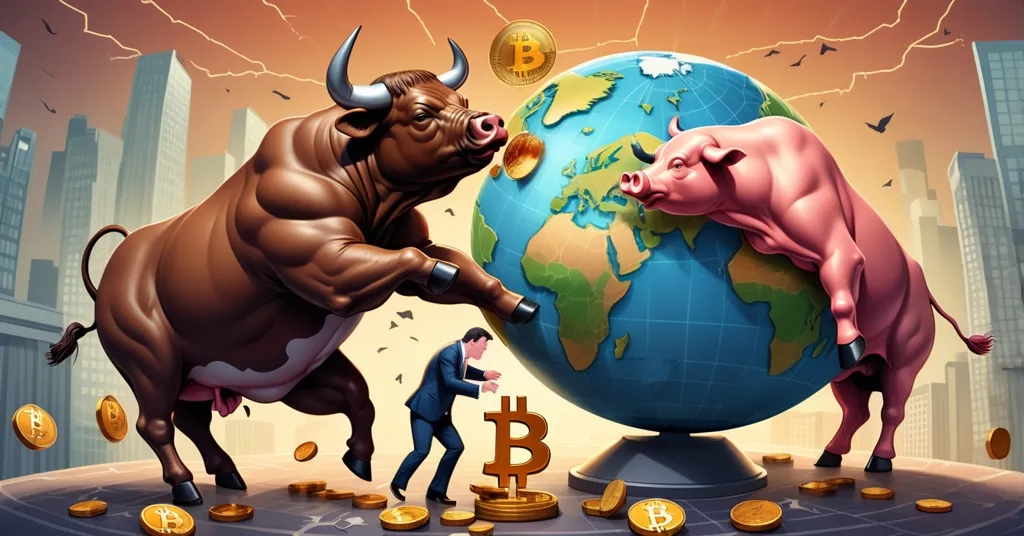Trump Denies Inflation, Demands Fed Rate Cut, Slams China’s Tariffs: Crypto Implications

Trump’s Economic Stance: No Inflation, Fed Should Lower Rates, China’s Tariffs Ridiculous
- Trump denies inflation despite data showing 2.4%
- Urges Federal Reserve to cut interest rates
- Criticizes China’s “ridiculous” tariffs
Former President Donald Trump recently dropped a bombshell on the economy, claiming that there is no inflation and urging the Federal Reserve to cut interest rates. He also took a jab at China for what he considers excessively high tariffs. Let’s dive into the details and see how these bold statements could shake up the world of cryptocurrencies and beyond.
Trump’s Inflation Denial
Trump’s assertion that “there is no inflation” flies in the face of recent data from the Federal Reserve, which shows inflation at 2.4% over the last year. That’s down from a peak of 7.1% in 2022, but it’s still above the Fed’s target of 2%. For those in the Bitcoin and cryptocurrency space, inflation rates can be a big deal. High inflation often drives investors towards decentralized finance (DeFi) as a hedge against the devaluation of fiat currencies. But Trump’s denial of inflation? That’s about as realistic as a unicorn in the White House.
Decentralized finance, or DeFi, refers to financial services built on blockchain technology, allowing transactions without traditional banks. Think of it as cutting out the middleman in finance, which can be a game-changer in a world where inflation erodes the value of money.
The Federal Reserve’s Stance
Trump didn’t stop there. He argued that “the Federal Reserve should lower interest rates.” However, the Fed’s been holding steady, keeping the federal funds rate (the interest rate at which banks lend to each other overnight) at a target range of 5.25% to 5.5% since July 2023. They’re not budging until inflation sustainably hits their 2% target. Lower interest rates could theoretically boost investment in cryptocurrencies by making borrowing cheaper, but the Fed’s current stance suggests they’re not ready to ease up just yet.
This tug-of-war between Trump and the Fed could have ripple effects in the crypto market. Bitcoin maximalists might see this as another reason to stick with the king of crypto, while others might look to altcoins or DeFi platforms to navigate the economic landscape.
China Tariffs and Crypto
Trump’s critique of China’s tariffs, labeling them as having been raised to “ridiculous levels,” is rich with irony. During his own presidency, Trump slapped a 10% baseline tariff on nearly all imports from most of the world, a move that China reciprocated, escalating trade tensions. These tariffs can wreak havoc on global supply chains, which might drive interest in decentralized systems that bypass traditional financial infrastructures.
Imagine a world where trade wars push businesses to seek alternatives to traditional finance. That’s where cryptocurrencies and blockchain technology can shine, offering a way to conduct transactions without the hassle of tariffs and geopolitical squabbles.
Broader Implications for Crypto
Trump’s statements reflect his ongoing critique of current economic policies and his critical stance on international trade, especially with China. Even after leaving office, his views still stir the pot in public discourse. In the cryptocurrency sphere, such geopolitical frictions can underscore the appeal of decentralized financial systems that operate beyond national borders and political whims.
Looking at the bigger picture, Trump’s comments on inflation, interest rates, and tariffs are more than just about traditional economics. They touch on issues like economic stability, which can impact the adoption and valuation of cryptocurrencies. As Bitcoin and other digital assets continue to grow as a response to centralized financial systems, understanding the nuances of economic policy becomes crucial for crypto enthusiasts.
Key Questions and Takeaways
- What is Trump’s view on inflation?
Trump believes there is no inflation, despite data showing a 2.4% rate.
- What action does Trump suggest the Federal Reserve should take?
He suggests that the Federal Reserve should lower interest rates.
- How does Trump describe China’s tariffs?
He describes them as having been raised to “ridiculous levels.”
- What does Trump’s statement indicate about his views on current economic policies?
It indicates his ongoing critique and dissatisfaction with current economic policies.
- How does Trump’s perspective on China’s tariffs reflect his views on international trade?
It reflects his critical stance on international trade relations, particularly with China.
As the crypto community watches these economic developments, it’s clear that the interplay between traditional economic policies and the rise of decentralized finance will continue to be a critical area of focus. Whether you’re a newcomer or a seasoned veteran in the crypto space, staying informed about these dynamics is key to navigating the future of money and finance.
While Trump’s economic views might be more like a circus act than a policy blueprint, they highlight the importance of understanding how economic policies can impact the crypto market. From Bitcoin’s role as a hedge against inflation to the broader appeal of decentralized systems in the face of trade wars, the crypto space is at the forefront of financial innovation. So, keep your eyes peeled and your wallets ready for the next big shift in the world of money.



